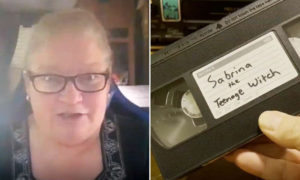A Texas woman recently discovered she has a felony record — one she didn’t know about — from when she lived in Oklahoma. For a rented VHS tape that wasn’t returned.
That state’s criminal records say she “feloniously embezzled” the VHS tape, the NBC affiliate in Oklahoma City reported (here; read more details here). She doesn’t even remember renting it, and wonders if “the young man that I lived with at the time” did so in her name.
Man, you better not steal a library book in that state, or they’ll come for you. Actually, the problem is they didn’t come for her. From the story, it appears she was merely charged, never convicted or even notified. She knew nothing about it, and now she believes she lost employment opportunities because of it.
The current D.A. plans to dismiss the charge, but she apparently has to sue the state to get that record expunged. I’m thinking she should sue for more than that. From what I’ve read about Oklahoma theft law (here) and embezzlement law (here), the monetary value of a VHS tape is nowhere near the threshold for charging a felony (at least $500).
 The business isn’t around anymore, but charges are filed by police, not private citizens, so I would think she could sue the police department that filed this as a felony, as well as the D.A. who didn’t prosecute it, but instead let it fester and harm the reputation of a person who was never prosecuted for a crime.
The business isn’t around anymore, but charges are filed by police, not private citizens, so I would think she could sue the police department that filed this as a felony, as well as the D.A. who didn’t prosecute it, but instead let it fester and harm the reputation of a person who was never prosecuted for a crime.
The problem is more widespread than this single case. There are a lot of these kind of charges in a lot of states just sitting there until someone gets pulled over, has some contact with police, does a police report on themselves. The business filed a complaint and may have even started a civil action over a VHS tape, or more recently CDs. In this way Blockbuster lives on. Of course blockbuster tapes were always valued by Blockbuster at a much higher value which sometimes happened to match a states threshold.
Districts where police, prosecutors and courts actually go through records to dismiss this sort of old case are not all that common and mistakes happen in all districts.